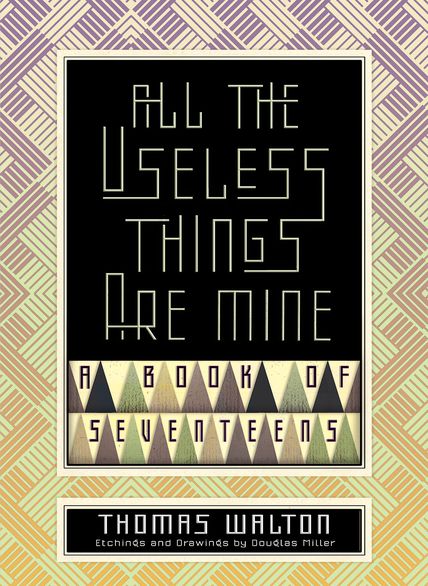
Buy this Book at
Amazon Asterism Books Barnes & Noble Blackwells (UK) Bookshop.org Foyles (UK) Open BooksThis is a book of seventeen-word sentences, of aphorisms and otherisms. The aphorisms are in the tradition of Porchia, Blake, The Tao Te Ching, and Wittgenstein. The otherisms find their ancestors in Gertrude Stein, cabaret, Hejinian, haiku, and noir pulp fiction. Arranged thematically to respond to various themes—politics, love and sex, parenthood, the afterlife, etc.—both what’s lofty and lowly are represented in these wildly imaginative and strangely intimate “seventeens.”
At times pithy, poetic, surreal or profane, each line is a concise world of wonder. Here is a collection of seventeen-word landscapes, snapshots and found bits of lint, learning and linden leaves that can be nibbled on, a few at a time, or binged in quick succession.
All the Useless Things Are Mine is illustrated with seventeen etchings and drawings by Douglas Miller, and includes an afterword by Elizabeth Cooperman.
Singer/songwriter Ivory Smith has composed an album based on the book.
Notices
“Lyrical, discerning, amusing; overflowing with Eros, blue skies and happy bees—all vibrating at high, poetic frequency.”
—Alex Stein, editor of Short Circuits: Aphorisms, Fragments and Literary Anomalies
“Though I despise and distrust pablumic book blurbs, these are so marvelous I wish I wrote them.”
—Richard Kostelanetz, author of Deeper, Further & Beyond: More Critical Critical Essays
“Elegant and profound, whimsical to the point of daffy, a minesweeper of the mind’s oyster pearl harbor.”
—Doug Nufer, author of Metamorphosis
“Bizarreries, poems seen in a flash of lightning, wisecracks, outbreaks of pure wonder—all shorter than this blurb.”
—James Richardson, author of Vectors: Aphorisms and Ten-second Essays
“Sing, Muse! News, please: What’s Prime, but not Amazon? What’s aptly dizzily heptadecimal, but not Japanese? These.”
—Richard Kenney, author of Terminator
“Reader, prepare yourself for maximal minimalism—call it haiku plus—in these seventeen-word observations laced with humor.”
—Amaranth Borsuk, author of The Book
“Pessoan poetics and absurd humour permeate this collection of bucolic, melancholic blips of concision, precision, and elision.”
—M.J. Nicholls, author of Scotland Before the Bomb
“No matter which of the seventeens most appeal to you—the magisterial or the witty—you will likely find yourself affected by this book: you’ll start to see the world as a series of potential seventeens, just waiting to be written. When you leave your quarantine for the world outside, your eyes will scan around, trying to find pieces you can frame within seventeen words. It’s a constraint that is at once a manageable size but also capable of inspiring revelatory moments.”
—Paul Constant in The Seattle Review of Books
“Although [humor] is present throughout the book, the underlying sensibility is meditative. The lasting impression of All the Useless Things is less one of jokiness than of tenderness: for nature, for creation, for language itself…. Walton sounds a note of modesty and throughout the book, the authority he questions is often his own…. There are no pretensions here for uplift, or for Whitmanian bluster, but reading it was, for me, a boost, a reminder of possibilities. This is highly original work by an active, restless mind, aware of the pressures of time.”
—Charles Holdefer in Dactyl Review
“All The Useless Things Are Mine … will fit in the back pocket of your jeans along with a pen. This is important as you may need other pockets for your wallet, mask, keys, and perhaps a snack if you venture out to read in public—circling or notating bits that resonate or instigate a giggle. Millers’ drawings coordinate well with Walton’s words, as both work to focus on the mundane in order to realize a larger observation about the world…. It’s a pleasure to indulge in momentary readings that end or convulse into viewings of lovely images that are half battled, sometimes fatigued, and always extraordinarily rendered.”
—Megan Bickel, in Ruckus
“Intimately, Walton’s latest work allows the reader to feel like we’re walking down the block, resting in the park, holed up under some bushes in a garden, or off in some shadowy nook of a house. But not to linger—to merely capture the moment, to create a literary impression—and then to move on. Walton’s work is once again spirited, and balanced within the two covers that hold it close. And yet the fluidity and sprawl of the world Walton has documented, like the haiku of Matsuo Bashō, the walking poems of Frank O’Hara, or the contemporary American Sentences of Paul E. Nelson, insists on the ‘something more’ of process, of origins, and of linearity’s charm.”
—Greg Bem, in North of Oxford
“A book of seventeen-word sentences that lean at times toward aphorism, and at others toward stand-up comedy…. Walton doesn’t seem afraid to go ‘too far’…. The elegant black and white images may also be seen as ‘useless things’: a house fly, a crow’s shadow, part of a cat’s head…. The reader, ultimately, will have to make up their own mind as to whether this book belongs with aphorisms, haiku, comedy, social commentary, koans, or something else entirely.”
—Eric Vasquéz, in Rain Taxi
